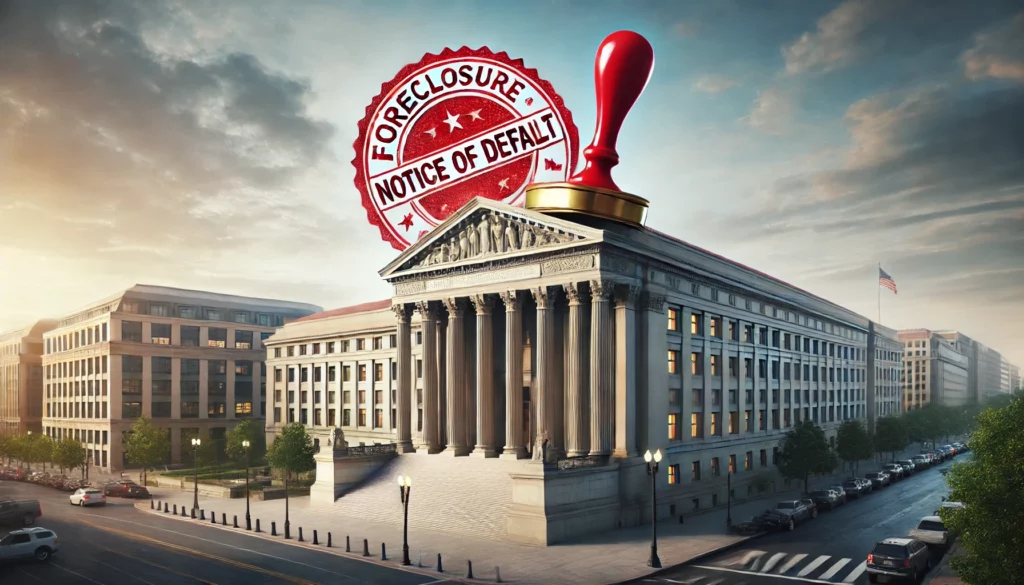Foreclosure Notice of Default in Washington DC – What is It?

Introduction
If you’re searching for information on a “Foreclosure Notice of Default in Washington DC,” you’re likely feeling stressed and overwhelmed. Receiving a notice of default means you’re in a precarious financial situation, and the looming threat of foreclosure can be terrifying. Whether you’ve missed a few mortgage payments or have fallen behind due to unforeseen circumstances, this notice is a wake-up call that your home may soon be taken from you. You probably have several questions, such as: What exactly is a foreclosure notice of default? What does it mean for me and my home? How long do I have to act before things get worse? And most importantly, what are my options to avoid foreclosure in Washington DC?
You’re not alone. Many homeowners face this stressful situation and feel uncertain about what steps to take next. This blog is designed to give you a clear understanding of what a Foreclosure Notice of Default means, how it works in Washington DC, and the crucial steps you can take to stop foreclosure before it’s too late. We’ll also discuss the possible costs involved, the pros and cons of each option, and why selling your home to a reliable company could be a better alternative than dealing with the bank or going through a lengthy foreclosure process.
Understanding the Foreclosure Notice of Default in Washington DC
A Foreclosure Notice of Default is a legal document that notifies you, the homeowner, that you’ve fallen behind on your mortgage payments and that the lender is beginning the process of foreclosing on your home. In Washington DC, a Notice of Default is typically the first formal step the lender takes toward foreclosure, and it’s a serious matter that shouldn’t be ignored.
This notice usually follows after a period of missed payments—typically around 90 days—and signifies that you have defaulted on your loan. You might wonder, “What happens next?” At this stage, your lender is required to send you the notice and give you an opportunity to either catch up on payments or attempt to resolve the situation through other means, like loan modification or a short sale.
The Notice of Default doesn’t necessarily mean that your home will be immediately foreclosed upon, but it does start the clock ticking on the process. In Washington DC, the foreclosure process can take anywhere from a few months to over a year, depending on various factors such as the specific lender, the court system, and your actions during the process.
What Does a Foreclosure Notice of Default Mean in Washington DC?
A Foreclosure Notice of Default is an official statement from your mortgage lender that you’ve defaulted on your home loan. For homeowners in Washington DC, it’s essential to understand the specific local regulations regarding foreclosure. In Washington DC, the process can begin as soon as you miss a payment, but the lender is required to follow specific procedures before moving forward with foreclosure.
Once the notice is sent, you may have up to 30 days to respond. This is often the time during which you can work out a solution, such as catching up on missed payments or negotiating a payment plan with your lender. It’s important to note that you may also have the option of refinancing or modifying your loan to get back on track. However, if you fail to resolve the matter during this time, the lender can begin the next steps in the foreclosure process, which may include a court action.
Many people in your position may feel paralyzed or confused by the next steps. However, the sooner you act, the more options you’ll have. If you want to learn more about your rights and how you can stop foreclosure from happening, be sure to check out our page on How To Stop The Bank From Foreclosing On Your House for comprehensive guidance on navigating the foreclosure process in Washington DC.
Steps You Can Take After Receiving a Foreclosure Notice of Default
Once you’ve received a Notice of Default in Washington DC, you need to take immediate action. Ignoring the notice will only lead to further legal action, and it’s important to understand that this notice is not the final step. In fact, there are several paths you can take to avoid foreclosure:
- Contact Your Lender: The first step after receiving a notice of default is to contact your lender directly. Most lenders are willing to work with homeowners to find a solution, especially if they understand your financial situation. Be honest about your circumstances and see if they are open to alternatives such as loan modification, forbearance, or a payment plan.
For more tips on negotiating with your lender, check out this guide from Consumer Financial Protection Bureau (CFPB).
- Refinance or Modify Your Loan: In some cases, refinancing your mortgage or modifying the terms of your loan can help you catch up on missed payments and avoid foreclosure. Refinancing involves taking out a new loan to pay off the existing one, while loan modification involves changing the terms of your current loan to make it more affordable.
- Explore a Short Sale: If keeping your home is no longer financially feasible, a short sale may be an option. This is when the lender agrees to allow you to sell the home for less than the mortgage balance. The proceeds from the sale go toward repaying the lender, and you may be able to walk away without owing anything further. To learn more about the differences between a short sale and foreclosure, visit our page on Short Sale vs. Foreclosure – What’s the Difference?.
- Consider Selling Your Home to a Company: If refinancing or negotiating with the bank doesn’t work, selling your home to a reliable cash-buying company can be an excellent option. Companies that buy homes for cash can often close quickly, avoiding the lengthy foreclosure process. This may give you the relief you need to move forward without the financial burden of foreclosure.
These options all have their pros and cons, and it’s important to evaluate your situation carefully. If you want to discuss your options further or need guidance on how to navigate this process, be sure to explore all the possible alternatives thoroughly.
The Consequences of Foreclosure: What You Need to Know
Foreclosure can have serious consequences that go beyond losing your home. In Washington DC, a foreclosure can remain on your credit report for up to seven years, which can make it difficult to obtain loans or credit in the future. Additionally, if the sale of your home doesn’t cover the full amount of your mortgage, the lender may pursue a deficiency judgment to collect the remaining debt.
The emotional toll of foreclosure can be significant as well. Losing your home is a traumatic experience, and the financial consequences can affect your long-term financial stability. This is why it’s crucial to explore every option before letting the foreclosure process go too far.
Exploring Loan Modification as an Option to Stop Foreclosure
If you’re trying to avoid foreclosure after receiving a Notice of Default in Washington DC, one option that may be available to you is a loan modification. A loan modification is a change to the original terms of your mortgage loan, often making it more affordable and manageable for you. This can include reducing the interest rate, extending the repayment period, or even deferring some of the payments until later.
Loan modifications are often offered by lenders to help homeowners who are struggling with temporary financial hardship. This could be due to factors like job loss, medical emergencies, or a sudden decrease in income. If you’re eligible, a loan modification can allow you to keep your home while catching up on missed payments.
However, loan modifications aren’t always guaranteed. Lenders will typically require proof of income and financial hardship, and they may only agree to modify your loan if they believe it’s in their best interest. The process of applying for a loan modification can be complex and time-consuming, and there’s no certainty that your request will be approved.
If you’re unsure whether a loan modification is right for you or need assistance navigating the process, it may be helpful to reach out to a housing counselor or legal professional who specializes in foreclosure prevention.
The Impact of Foreclosure on Your Credit and Financial Future
One of the most significant consequences of foreclosure is its impact on your credit score and financial future. Foreclosure can stay on your credit report for up to seven years, significantly lowering your score and making it difficult to qualify for loans, mortgages, or even credit cards in the future. In Washington DC, the average foreclosure can cause a homeowner’s credit score to drop by as much as 200 points, which can push you into a high-risk category for lenders.
A lower credit score can have far-reaching effects. Not only will it make it more difficult to secure housing or a car loan, but it could also result in higher insurance premiums, difficulty securing employment, and higher interest rates on any credit you do qualify for. Additionally, the emotional toll of foreclosure can affect your mental and emotional well-being, leading to stress, anxiety, and feelings of insecurity.
Given these consequences, it’s crucial to consider all your options for avoiding foreclosure before it’s too late. Selling your home quickly through a cash buyer or exploring alternatives like refinancing, loan modification, or a short sale could help you prevent foreclosure and minimize the damage to your credit score.
If you want to know more about the impact of foreclosure on your credit and how to rebuild it, Experian offers comprehensive information on improving your credit score after a foreclosure.
Why Selling to a Company May Be the Best Option for You
If you’re facing foreclosure, selling your home to a reliable cash-buying company can be one of the fastest and most stress-free ways to avoid foreclosure. Unlike traditional sales, where the process can take months, a cash sale can be completed in as little as seven days. This gives you a chance to move on and avoid the damaging effects of foreclosure.
Additionally, when you sell to a company, you can often sell your home “as-is,” meaning you won’t have to make any costly repairs or deal with the usual selling expenses. This can save you time and money, especially when you’re under pressure.
Conclusion: The Best Path Forward After Receiving a Foreclosure Notice of Default
If you’ve received a Foreclosure Notice of Default in Washington DC, the most important step is to act quickly. While there are various options available, such as negotiating with your lender or pursuing a short sale, selling your home to Local Home Buyer could be the best way to resolve the situation fast. By selling to Local Home Buyer, you can bypass the lengthy foreclosure process and avoid the negative impact it can have on your credit and future financial stability.
Local Home Buyer offers a fast, hassle-free cash sale that can close in as little as seven days, allowing you to move on without the stress of repairs or additional costs. We buy homes in any condition, so you won’t have to worry about making expensive fixes. Plus, there are no commissions or hidden fees, so you can keep more of the proceeds from your sale. If you’re facing foreclosure and need a quick, reliable solution, Local Home Buyer is here to help. Reach out today to learn how we can assist you.
